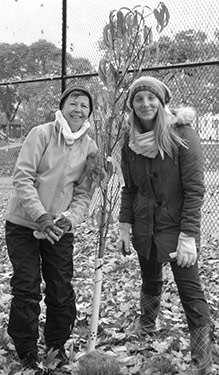London gets guerrilla planted fruit trees
 CREDIT: JERROLD RUNDLE
CREDIT: JERROLD RUNDLEFrom left: Sarah Wall and Deena Malpage with a donated plumcot at Food Not Lawns' tree planting on November 1.
London’s chapter of Food Not Lawns (FNL) teamed up with Steve “The Tree Hustler” Leroux to bring a bit of flair to the Forest City tree cover on November 1.
The volunteers guerrilla planted over a dozen fruit and nut bearing trees in public and private land around the city, with and without direct approval.
Western University, Terry Fox Park and the Peace Garden at Forks on the Thames all received the new trees, but Victoria Park will hold Steve’s pride and joy.
“The Northern Sunripe Plumcot [a graft between apricot and plum] is the only [one] of its kind in the world, also it will be the first to bear fruit in public,” Leroux said.
FNL member Teresa Rutten organized the event to help educate young people.
“A growing concern for London’s youth – many don’t understand where their food comes from,” she said. “I believe it [is] critical for youth to see positive models of food from the seed to the table.”
Rutten and Sarah Wall both echoed a message of Food Not Lawns – when you plant in your front yard, you establish a relationship in the neighbourhood, which establishes a community.
But getting fruit trees into a city is a slow bureaucratic process, and London isn’t an exception, said Leroux. “It takes six to twelve months usually to get approval for planting. It’s unacceptable, we needed to stop talking and start planting,” the self-described edgy farmer said.
Movements like this are growing around the world. A group of guerrilla grafters in San Francisco took it upon themselves to help feed their local communities, grafting fruit-bearing shoots to existing trees around the city.
Fanshawe Photography graduate Deena Malpage volunteered for the tree planting after Wall told her about the event.
“I was already passionate about natural and locally sustainable food,” she said. “There’s something liberating about knowing you grew that.”
But there are detractors. Rutten said that most schools were reluctant or unwilling to participate with her even knowing the trees were free.
“When I went to B Davidson [Secondary School], initially they didn’t want it,” she said. “The reason they said was messy fruit.”
A valid concern as many know the vast raccoon, skunk and insect populations within cities.
Rutten didn’t seem worried about upkeep though, instead asking, “How does much Reforest London spent on upkeep of trees in London?”
ReForest London is the program behind the Million Tree Challenge, which aims to repopulate London’s tree cover with native species with the goal of planting 1 million more trees in the city.
Its primary concern is distribution and the self-sustainability through teaching about upkeep and care for the new tree investments – a program that recorded over 170,000 trees planted last year.
Despite the concerns, all involved thought the benefits of free food for locals outweighed the risk, with London bearing the fruit of their labours in the coming year.













